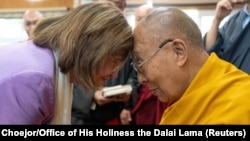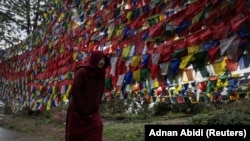In a monastery beneath snow-capped mountains in northern India, the Buddhist monk entrusted with protecting the Dalai Lama and foretelling his people's future is concerned.
The Dalai Lama turns 89 on Saturday and China insists it will choose his successor as Tibet's chief spiritual leader.
That has the Medium of Tibet's Chief State Oracle contemplating what might come next.
"His Holiness is the fourteenth Dalai Lama, then there will be a fifteenth, sixteenth, seventeenth," the medium, known as the Nechung, said. "In countries, leaders change, and then that story is over. But in Tibet it works differently."
Tibetan Buddhists believe that learned monastics are reincarnated after death as newborns. The Dalai Lama, who is currently recuperating in the United States from a medical procedure, has said he will clarify questions about succession - including if and where he will be reincarnated - around his ninetieth birthday. As part of a reincarnation identification process, the medium will enter a trance to consult the oracle.
The incumbent Dalai Lama is a charismatic figure who popularized Buddhism internationally and won a Nobel Peace Prize in 1989 for keeping alive the Tibetan cause in exile. Beijing sees him as a dangerous separatist, though he has embraced what he calls a "Middle Way" of peacefully seeking genuine autonomy and religious freedom within China.
Any successor will be inexperienced and unknown on the global stage. That has sparked concerns about whether the movement will lose momentum or grow more radical amid heightened tensions between Beijing and Washington, long a source of bipartisan support for the Central Tibetan Administration, or CTA, Tibet's government-in-exile.
The CTA and its partners in the West, as well as India, which has hosted the Dalai Lama in the Himalayan foothills for more than six decades, are preparing for a future without his influential presence.
U.S. President Joe Biden is expected to soon sign a bill that requires the State Department to counter what it calls Chinese "disinformation" that Tibet, which was annexed by the People's Republic of China in 1951, has been part of China since ancient times.
"China wants recognition that Tibet has been part of China ... throughout history, and this bill is suggesting that it would be relatively easy for Tibet supporters to get a western government to refuse to give recognition for such an extensive claim," said Tibet specialist Robert Barnett of London's School of Oriental and African Studies.
U.S. lawmakers, including former House speaker Nancy Pelosi, visited the Dalai Lama in June to celebrate Congress passing the legislation, which Sikyong Penpa Tsering, who heads the CTA, called a "breakthrough."
The bill is part of a strategic shift away from emphasizing Chinese rights violations such as forced assimilation, the Sikyong, or political leader, told Reuters. Since 2021, CTA has lobbied two dozen countries including the U.S., to publicly undermine Beijing's narrative that Tibet has always been part of China, he said.
With U.S. weight behind this strategy, the exiles hope to push China to the negotiating table, he said. "If every country keeps saying that Tibet is part of the People's Republic of China, then where is the reason for China to come and talk to us?"
The Chinese foreign ministry said in response to Reuters' questions that it would be open to discussions with the Dalai Lama about his "personal future" if he "truly gives up his position of splitting the motherland" and recognized Tibet as an unalienable part of China.
Beijing, which has not held official talks with the Dalai Lama's representatives since 2010, has also urged Biden not to sign the bill.
The office of the Dalai Lama, who has in recent years apologized for remarks he made about women and to a young child, referred an interview request to the Sikyong.
Succession questions
Most historians say Tibet was assimilated into the Mongol empire during the 13th-14th century Yuan dynasty, which also covered large parts of present day China. Beijing says that established its sovereign claim, though scholars believe the relationship varied greatly over the centuries and remote Tibet largely governed itself for much of the time.
The People's Liberation Army marched into Tibet in 1950 and announced its "peaceful liberation." After a failed uprising against Chinese rule in 1959, a young Dalai Lama fled into exile in India.
In 1995, atheist China and the Dalai Lama separately identified two boys as the Panchen Lama, the second-most-important Tibetan Buddhist leader. The Dalai Lama's pick was taken away by Chinese authorities and has not been seen since.
Many Buddhists consider Beijing's choice illegitimate, though most expect a similar parallel selection for the next Dalai Lama, given the Chinese government's stance that he must reincarnate, and it must approve the successor.
Chinese authorities have "tried to insert themselves into the succession of the Dalai Lama but we will not let that happen," said Michael McCaul, Republican chairman of the House Foreign Affairs Committee during his Dharamsala visit.







